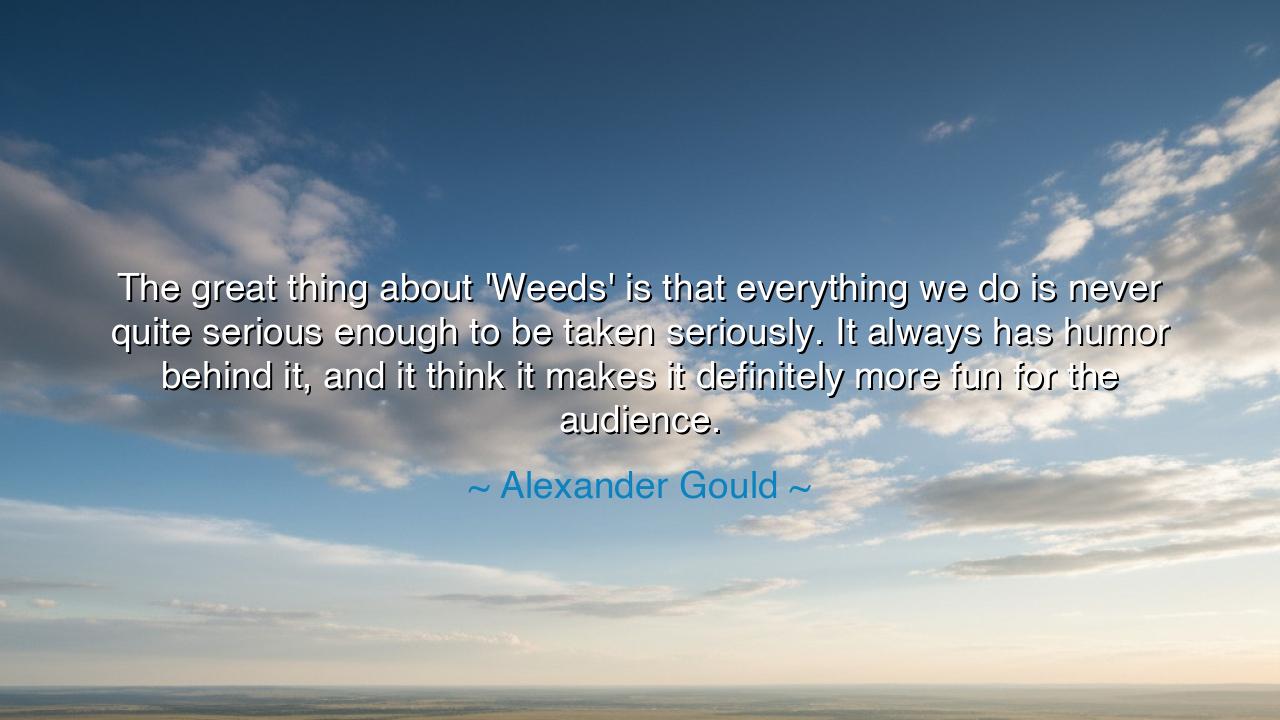
The great thing about 'Weeds' is that everything we do is never
The great thing about 'Weeds' is that everything we do is never quite serious enough to be taken seriously. It always has humor behind it, and it think it makes it definitely more fun for the audience.






The words of Alexander Gould flow with a truth that transcends the stage and the screen: “The great thing about ‘Weeds’ is that everything we do is never quite serious enough to be taken seriously. It always has humor behind it, and I think it makes it definitely more fun for the audience.” Though he speaks of a television show, the wisdom within his reflection belongs to the ages — for he touches upon the delicate balance between light and darkness, between laughter and gravity, between the truths that wound and the smiles that heal. His insight reveals the ancient power of humor: that it can soften the sharpness of truth, making it bearable, relatable, and even joyful.
The origin of his thought lies in the paradox of storytelling itself. From the earliest myths and dramas, humanity has wrestled with the question: how do we speak of life’s deepest struggles without drowning in their weight? The great storytellers — from the playwrights of Greece to the poets of India — understood that laughter was not an escape from pain, but a companion to it. So too does Gould recognize that the strength of ‘Weeds’ lies in its refusal to surrender completely to despair. The show’s themes — of survival, hypocrisy, family, and moral compromise — are woven with humor, not to trivialize them, but to remind the audience that even in folly, there is humanity.
In this, Gould’s words echo the spirit of the ancients. The great dramatist Aristophanes once wrote comedies that mocked power, politics, and human vanity — and yet, through laughter, he revealed truths that tragedy alone could not touch. Humor, when wisely used, becomes a torch that lights the shadows of human behavior without setting them aflame. The laughter it evokes is not shallow; it is cleansing. It releases tension, allowing reflection to enter where shame or fear might otherwise close the heart. Thus, in the playful tone of ‘Weeds’, Gould sees not mockery, but mercy — the mercy of seeing our flaws through the lens of understanding rather than condemnation.
To say that something is “never quite serious enough to be taken seriously” is not to deny its meaning, but to affirm its freedom. For when art or life becomes too solemn, it risks turning rigid — like a statue so heavy with dignity that it forgets to breathe. Humor keeps the living spirit alive. It allows the artist to explore the absurdity of existence without arrogance, to speak truth without cruelty. Alexander Gould’s insight reflects the wisdom of balance: that seriousness and laughter are not opposites, but partners in the dance of meaning. Where solemnity teaches depth, humor teaches humility — and together, they reveal the full spectrum of life.
This truth extends far beyond the realm of performance. In the halls of leadership, in the chambers of learning, even in the quiet struggles of the heart, the ability to find humor in hardship is a mark of wisdom. Consider Abraham Lincoln, who, in the darkest years of the American Civil War, used wit not as distraction, but as balm. He said, “If I did not laugh, I should die.” His laughter, like Gould’s philosophy, did not trivialize suffering; it humanized it. Through humor, Lincoln held together both courage and compassion — teaching that the mind can be clear and the heart light even in the shadow of great seriousness.
The lesson, then, is timeless: do not let the weight of seriousness crush the joy of expression. Whether in art or in life, seek the humor that lives beneath difficulty. Let laughter coexist with responsibility, and grace with truth. The most profound messages are often carried not by thunder, but by song; not by wrath, but by wit. When Gould speaks of making the experience “more fun for the audience,” he is pointing toward the eternal purpose of storytelling — to give people not only understanding, but relief; not only wisdom, but warmth.
And so, dear listener, learn from Alexander Gould’s reflection. In your own story — in your trials, your work, your relationships — do not fear to smile even in the face of hardship. Life, like great art, is never meant to be taken so seriously that it ceases to be joyful. Humor is not the denial of meaning; it is its illumination. To laugh is to rise above despair without denying it, to find clarity in chaos, to transform sorrow into strength. Let every serious thing you do carry a touch of lightness, and every lighthearted thing carry a trace of truth. For in that balance lies the wisdom of both the artist and the sage — the laughter that redeems, the joy that endures.






AAdministratorAdministrator
Welcome, honored guests. Please leave a comment, we will respond soon